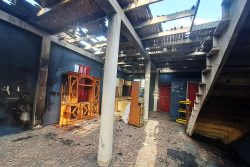– but concerns about sustained enhanced literacy, numeracy linger
The seven-year Basic Educa-tion Access and Management Support (BEAMS) programme which brought about much reform in the local education system has been touted a success even as consultants express some reservations about sustained improved literacy and numeracy.
After having done much review and analysis of the project’s components which included direct interviews with stakeholders, Paula MacKinnon of Mindbloom Consultants is confident that much has been achieved and that access to secondary education has been expanded.
The Inter-American Deve-lopment Bank (IDB) funded BEAMS programme, which was executed through the National Centre for Education Research Development introduced many new teaching methodologies in schools coupled with intense training in several areas for nursery and primary school teachers. Four new schools were also built under the programme: the Aurora, Bartica, Diamond and Hope secondary schools and five rehabilitated: the Bladen Hall and North Ruim-veldt Multilateral schools and the Tutorial, Charlestown and Lodge Community High schools.
On Thursday MacKinnon told an exit workshop that the project’s terms of reference also asked Mindbloom to visit the four new schools where she said deficiencies in maintenance were noticed and swift rectification advised. She also pointed out that some safety and construction deficiencies needed to be addressed and observed that the maintenance of gutters is a huge problem and compromises integrity of the roofs. Several ministry officials including those from all the education districts attended the session.
The BEAMS programme also enabled the ministry to provide additional spaces at the secondary level to help support universal secondary education policy. Thousands of manuals have been created to aid the different programme expansions and teachers trained accordingly. Additionally, the programme saw the introduction of a Masters in education at the University of Guyana.
Mindbloom will compile the project completion report which will advise on the achievements as well as shortcomings of the programme, for submission to the bank. This is the third IDB-funded project in the area of education.
The workshop which was hosted to assess the results of the programme in keeping with the achievement of the development objective; was also geared at identifying project challenges and sustainability issues and at pointing out lessons learnt that could be applied to the design of future similar projects. The main objective of the project was to contribute to sustainable socio-economic development and equitable poverty reduction.
MacKinnon explained that in order to undertake her task of properly evaluating the project she used qualitative and quantitative indicators, perused close to 250 documents provided, did several interviews with stakeholders and also conducted classroom observations. She also held discussions with parents.
Commenting on the introduction of technology in teaching methodologies, she noted that it brought with it much interactivity which engaged the students. As regard the nursery literacy programme, MacKinnon said it reflected a quality early childhood education. “We visited the children and we saw them very involved and engaged,” she said. However, she noted that the primary-aged pupils did not seem to be very engaged and as such she hoped consideration could be given to putting children into classrooms as if different grades share the same floor with only a blackboard to separate the classes, they would be easily distracted.
Meanwhile, she said the Interactive Radio Instruction (IRI) programme is popular with the students and has made teachers more confident in teaching Mathematics, adding that she and other team members noted the national profile for mathematics. “Teachers are liberated to use the new methodologies and other forms of assessment in the classroom and are more open,” she opined. MacKinnon also said undertaking the IRI was a significant amount of work and expertise. She noted too that the efforts to rewrite the curriculum and the magnitude of the teacher training programme cannot be overemphasized. “It was a huge undertaking and in the end so many teachers were trained in so many components of the programme it is commendable the volume that was undertaken,” she said.
Pointing to the new education act, another offshoot of the programme, MacKinnon said the document is significant and provides a blueprint for a modernized education ministry. Even as she voiced reservations about sustained improved literacy and numeracy MacKinnon noted that both she and her team have come to appreciate the challenges in Guyana regarding services necessary to build schools. “…and we appreciate the challenges that would face the ministry in this regard,” she said. She also recommended that as Guyana moves forward extra attention be given to ensuring that there is confidence to challenge consultants about their recommendations “with regard to your country because of its diversity.” She stressed that one would definitely have to visit areas like the hinterland to understand certain things.






